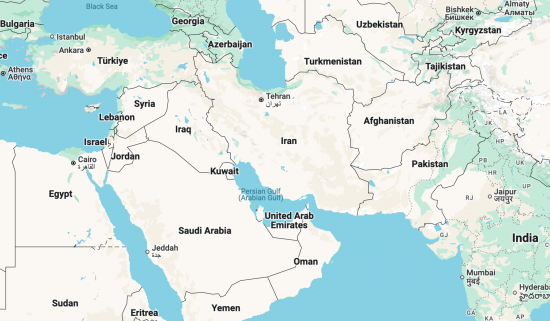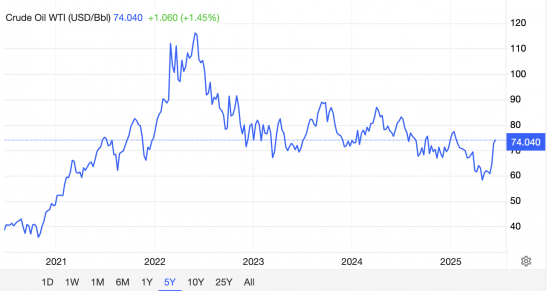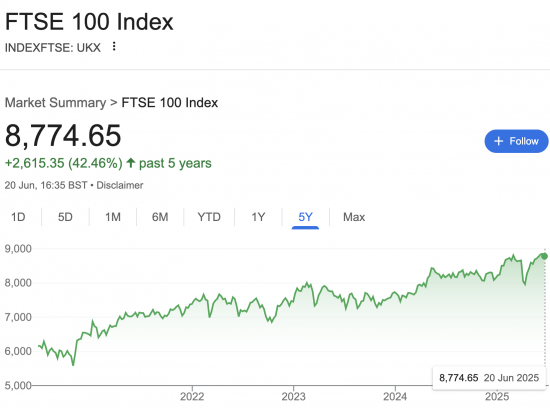Iran has ordered the closure of the Strait of Hormuz. This is the 30-mile gap between Iran and the United Arab Emirates, as shown on this map from Google. The waterway is just above the word 'Arab' in the UAE's name:

The economic consequences of this action will be considerable.
That Iran is choosing to do it is one of the more predictable outcomes of what the USA did last night.
Approximately 20% of the world's oil and liquid gas flows through this strait. The tankers which pass through this narrow strip of water are large, relatively slow-moving, and almost impossible to defend. Iran can, as a result, disrupt the flow of oil and gas to large parts of the world, safe in the knowledge that there will be little impact on its own exports, 90% of which go to China.
The inevitable consequence of the closure will be a substantial increase in global oil prices, probably starting tomorrow morning. They have been running at around $75 per barrel, as this chart from Trading Economics shows:

It is quite possible that $100 a barrel is on the cards once again now, and we all know the consequences of that.
As the chart shows, we saw price increases of this scale, and more, at the time of the onset of the Russian invasion of Ukraine. Those price increases proved to be utterly unnecessary: all that war did was temporarily disrupt the flow of oil for a short period, and the same will probably be true with regard to this action by Iran.
It is almost certain that this action is not going to reduce global oil supplies by 20%. Alternative shipping routes will be established relatively quickly because those alternatives already exist in many cases. Other sources of oil and gas might become more attractive for a while, and some places might well increase production.
But, there will be massive profiteering in the meantime, and what we can be sure of is that this will fuel another round of inflation driven by external factors over which the UK has no control, unless, of course, Keir Starmer is foolish enough to provide support to the US attacks on Iran, which I can still hope he will not do.
However, as is always the case in situations like this, it is worth spelling out precisely what the economic consequences of this are and what actions are, and are not, required as a result.
Firstly, the Bank of England will not need to increase interest rates to eliminate the inflationary consequences of this externally imposed price shock. That is partly because inflation of this type will, in any case, induce the reduction in demand that interest rates are supposed to deliver, albeit massively ineffectively. The singular negative impact of those externally imposed price increases will be hard enough for people to manage. To seriously increase their impact by increasing interest rates would not just be downright harmful, and they would also be utterly unnecessary and entirely counterproductive. However, what we know is that the Bank of England did increase rates in exactly similar circumstances in 2022, and I fear that they will be foolish enough to do so again. We are still paying the price for that folly: heaven knows what the cost will be this time.
Secondly, we are already living in an economy where the government's desired growth is hard to find, and economic activity looks to be fragile, in the extreme. The likelihood that an oil price shock will now make things worse is very high indeed. As a consequence, Rachael Reeves should be entirely forgetting her existing plans, and should instead be moving into a situation where she is planning to reflate the economy to prevent the risk of a serious downturn, and even recession.
The result is that I think that Rachael Reeves needs to get back to the Despatch Box very soon to describe what it is that she is going to do to save the UK economy in the face of what will, in effect, be a wartime situation. We have no idea how long this will last, but it is reasonable to expect that Iran is not going to be relaxed about this for some time to come.
Thirdly, as Gillian Tett noted in the Financial Times on Friday, when looking at an issue that I have been addressing for some time, which is the likelihood of a stock exchange crash, she said:
Three decades ago I became fascinated by the concept of “social silence” — or the idea advanced by intellectuals such as Pierre Bourdieu that what we do not talk about is more important than what we do. Right now this silence hangs heavily over the markets.
As she concluded:
And here we come back to the problem of social silence. ...
[I]t might not take much for equity markets to crack; but it also means that no one knows when (or if) this might occur. Sometimes it is indeed the silence that screams loudest of all.
In other words, she believes that in the face of overwhelming risk, markets can become paralysed by fear, but a trigger point could destabilise them very quickly.
When she wrote, she did not know what that trigger point might be. I would now suggest that we do. A massive oil price increase, coupled with major hostility between the US and Iran, with Israel directly involved, and a potential for other countries to be pulled in, is more than enough to create a massive stock exchange panic and a substantial fall in share prices. Markets may remain irrational in the face of this, but I very much doubt it. I suspect that the tipping point has arrived. Markets are heavily overvalued. They may not be for much longer.

When Donald Trump sent bombers into Iran on Saturday night, he no doubt thought that, like his predecessors when authorising such raids, he was going to undertake a surgical strike to take out a facility. I suspect that he saw very little risk to himself and thought that he could walk away without any significant consequences arising once the raid was over.
But Iran is not Iraq, not least because, unlike Iraq, Iran is a historic, clearly defined state with quite a high degree of internal cohesion, even if its people may not be terribly keen on their current leadership.
What is more, Iran has a much stronger strategic position than Iraq, and is much stronger economically, which fact is reinforced by its considerable alignment with China, which is no doubt enjoying the embarrassment that this conflict will impose upon the USA and Europe.
The US Secretary of Defence, Pete Hesgeth, might claim that the missions have achieved their goals, but there must be some uncertainty as to the truth of that claim as yet. However, the immediate goals were never the issue in this situation. The consequences always were.
One of those consequences will be for Trump himself. He promised the MAGA movement that he would not get involved in conflict outside the USA, and most especially in the Middle East, and now he has done so, directly, in complete contradiction to the policies of previous US presidents and in a fashion entirely contrary to the isolationist foreign policy that he promised. The MAGA may not forgive him. He might face a serious Republican backlash as a consequence.
The impact of this conflict will also be felt on the US economy, although the increased price of oil might make US shale profitable for a while, when nothing else will.
And, every country that still thinks it has some sort of alliance with the US will curse the economic consequences of what Trump has done.
No doubt, so too will you in due course when the impacts that I forecast hit, and the full folly of the Bank of England and Reeves will be exposed, yet again.
We are living in dangerous times, and amongst the dangers we face is a full-blown economic recession. Those with economic power in our country have the power to prevent this if they change their behaviour as a consequence of the development of a wartime environment, which is what we now have. My fear is that they will do no such thing, and then we will all be in deep trouble.
Thanks for reading this post.
You can share this post on social media of your choice by clicking these icons:
There are links to this blog's glossary in the above post that explain technical terms used in it. Follow them for more explanations.
You can subscribe to this blog's daily email here.
And if you would like to support this blog you can, here:


 Buy me a coffee!
Buy me a coffee!

One thing is for sure, we are going to get regime change, we just don’t know which country it will be in.
True.
Milton Freidman of the Chicago School claimed wrongly that inflation was always a monetary phenomena, discounting the obvious ‘cost-push’ inflations that constantly occur and make perfect sense to everyone. This was certainly true in 2022 as explained in Richard’s piece. Such inflations cannot be controlled by manipulating demand through interest rate hikes, as we learned to our cost.
The 2022 inflation worked its way through the system fairly quickly, as it was bound to do, despite Sunak trying to take credit for it. It’s just maths, really.
This time it could be much the same, although the markets might again misjudge it.
Much to agree with
Sorry to be morbid but…..
https://www.youtube.com/watch?v=GQzgHBjQzf4
One government minister (I forget her name) has already said that consumers will be protected from the consequences of an oil and gas price spike on their bills. The implication is that she will subsidise energy bill payers so that they are no worse off.
One of the first lessons in economics is that incentives matter.
So if implemented this would be really bad policy as there would be no incentive to seek out domestic energy replacement or avoid wars in the first place. The same incentive would apply to the suppliers of the subsidised customer.
We really should allow prices to rise if that’s the direction they take.
But what about cases when people have no choice? I’m renting a flat. The heating is maintained by the landlord. The costs for gas are paid by me. There is no incentive for my landlord to change the heating to something less dependent on fossil energy when the price goes up. So just increasing the price isn’t enough. Legislation has to also be improved and there needs to be compensation for people that are already struggling but have no choice. But I agree that simply subsidizing prices for everyone is wrong.
If the penny drops with the public that huge increases in their electricity, Gas, petrol and other bills are down to Israel and Trump the results might be interesting.
Yesterday I saw someone who I know who they are but not personally if that makes sense. They work/worked on gas tankers. Clearly if they go back to the day job their life is potentially at risk, thank you Zionists & Trump.
That Gillian Tett noticed social silence and its consequences as discussed by Bourdieu reflects well upon her. For where there is social silence there is always also the invisible socially repressed. How many times in history have our ruling classes been blindsided by seemingly entirely unpredictable revolutionary movements ?
Both the US and the UK present governments seem to be eyeless.